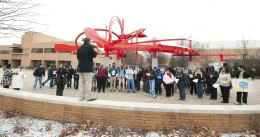
From the campus sculpture "Turning Points", the participants—bearing signs emblazoned with words such as “Together As One”--marched on to the Student Union singing the lyrics of the Bill Withers’ song Lean on Me.
Wright State University’s first Martin Luther King, Jr. march and rally to honor the late civil-rights leader drew scores of participants, who walked, sang and cheered in an effort to promote campus unity.
About 100 students, faculty and staff on Jan. 18 began the silent march at five different campus locations and converged at Turning Points, the big red sculpture in the middle of campus.
“The fact that we are going to join with the others at the Turning Points is a symbol that we have reached a turning point in our community,” student Shontel Buttram told marchers who gathered outside the Dunbar Library. “We are no longer content to talk the talk of unity, but to walk the walk.”
Carl Brun, professor of social work, said the march gave him time to reflect.
“It was very moving to be walking in silence,” he said.
From the sculpture, the participants—bearing signs emblazoned with words such as “Together As One”–marched on to the Student Union singing the lyrics of the Bill Withers’ song Lean on Me.
The group then assembled in the Apollo Room for the rally, which was punctuated by speeches from students, faculty and administrators.
Dan Abrahamowicz, vice president for student affairs, told the gathering that it was a day to reflect on the spirit of King, who was committed to human rights, solidarity, diversity and inclusion.
“This is the kind of activity that embodies the mission of Wright State University,” Abrahamowicz said.
Student Linh Tang, president of the Asian-Hispanic-Native American Council, said the march and rally demonstrate that unity is important to the participants even though they come from different backgrounds and ethnicities.
The rally was capped by the voicing of a pledge to support efforts to build an inclusive community; to raise awareness about the plight of those affected by poverty, violence and racism; and to advocate for those who feel oppressed because of their identity.
King–a clergyman, activist and prominent leader of the African-American Civil Rights Movement–received the Nobel Peace Prize for his efforts to end racial discrimination. He was assassinated in 1968. In 1986, Martin Luther King, Jr. Day was established as a U.S. federal holiday.

 Nearly 1,500 students graduate at Wright State’s spring commencement ceremonies
Nearly 1,500 students graduate at Wright State’s spring commencement ceremonies  Wright State University and Premier Health more closely align operations, creating a transformational partnership
Wright State University and Premier Health more closely align operations, creating a transformational partnership  Bottom Line, Wright State partnership aims to increase access to college
Bottom Line, Wright State partnership aims to increase access to college  Wright State’s nursing program celebrates 50th anniversary
Wright State’s nursing program celebrates 50th anniversary  Wright State celebrates Student Success Champions
Wright State celebrates Student Success Champions 